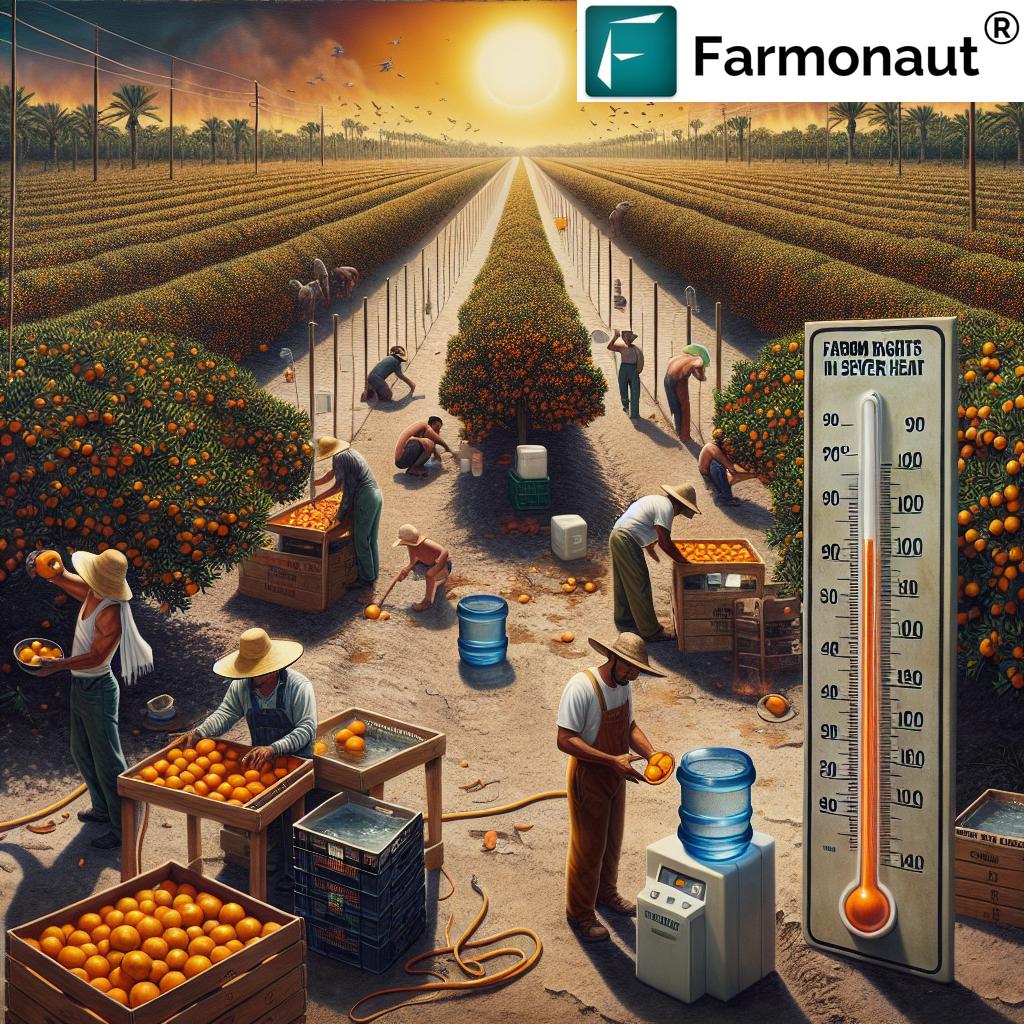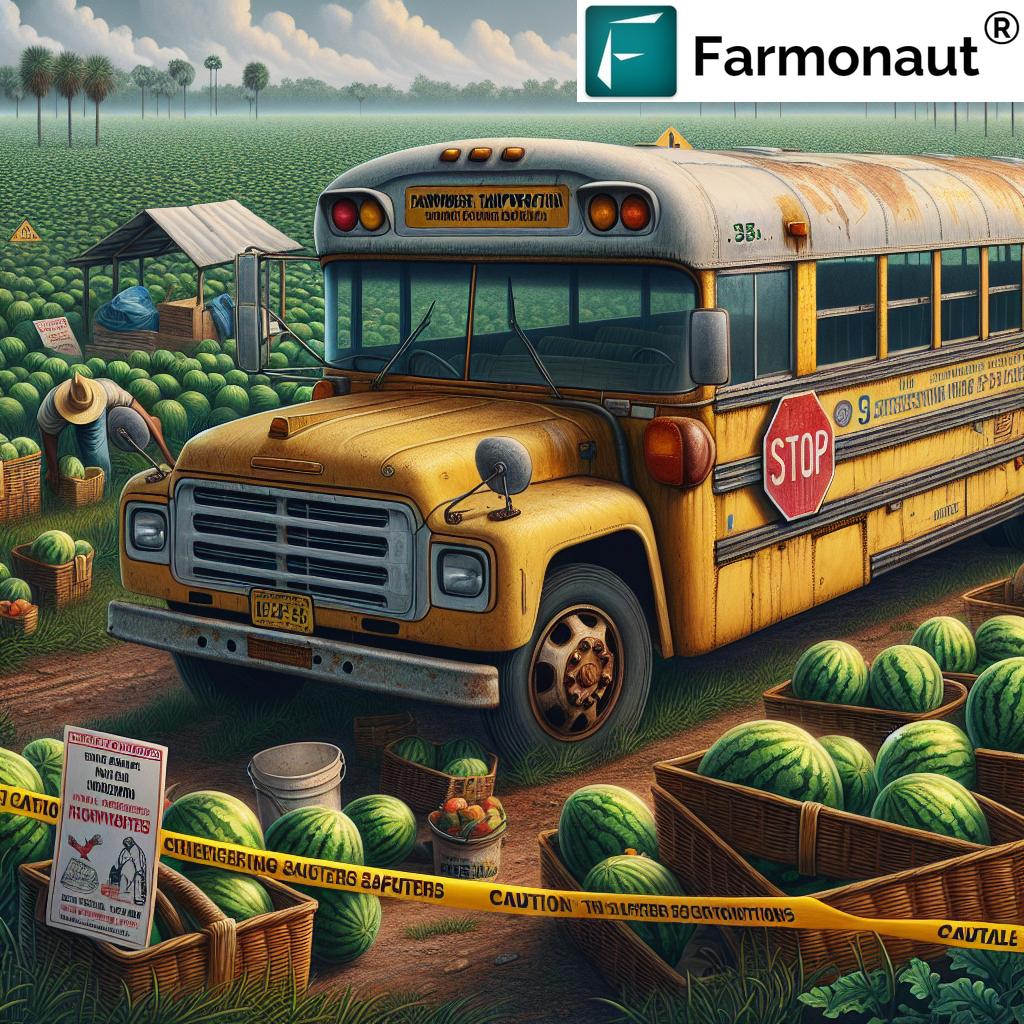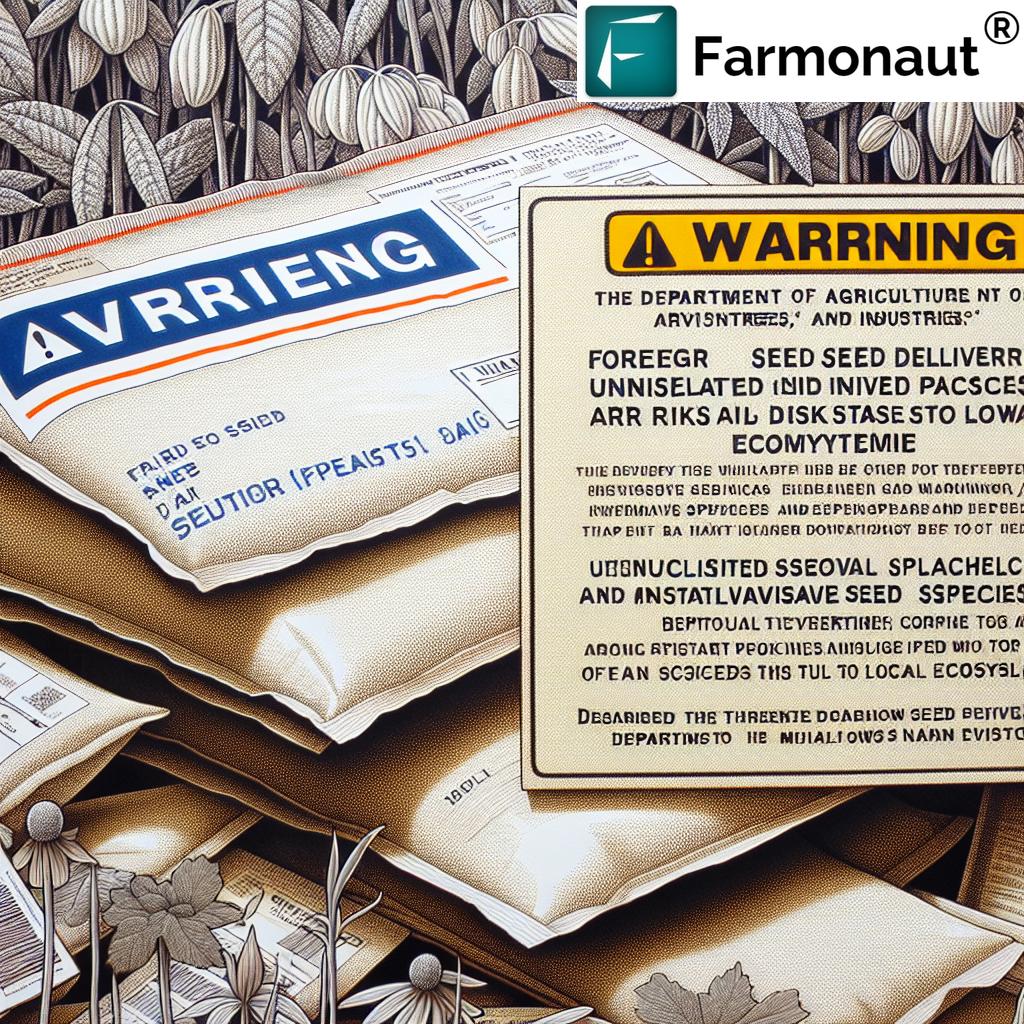Florida Farmworker Protections: Who Suffered, What Is

- Introduction
- Florida’s Agricultural Sector: The Backbone of the State
- The Urgent Need for Florida Farmworker Protections
- Heat-Related Illnesses and Fatalities: Extreme Risks for Workers
- Transportation Accidents: Persistent Hazards on the Road
- Sexual Harassment: Systemic Violations in the Fields
- Worker Rights Violations and Legal Challenges: Advocacy in Action
- Comparative Table: Key Florida Farmworker Protection Issues and Reforms
- Advanced Technological Support for Farmworker Safety: The Farmonaut Perspective
- Farmonaut Subscriptions
- FAQ: Florida Farmworker Protections
- Conclusion: Moving Forward with Comprehensive Protections
- Resources & Further Reading
Introduction
The state of Florida boasts one of the nation’s most productive agricultural industries, underpinned by the relentless labor of tens of thousands of farmworkers. From harvesting oranges in the blazing sun to braving hazardous rides in crowded buses and trucks, these workers confront dangers few outside the fields truly appreciate. For decades, we have relied on the expertise and resilience of these individuals—the majority of whom are immigrants—to keep supermarkets stocked and economies thriving.
Yet, as we explore the latest in Florida farmworker protections, the gulf between necessity and reality becomes evident. Inadequate regulations, frequent accidents, dangerous heat exposure, and systemic issues such as sexual harassment and legal uncertainty persist, prompting urgent calls for comprehensive reform. Our collective mission is to highlight the facts, challenges, and advocacy regarding essential worker rights within this pivotal sector.
Let’s delve deep into the statistics, recent incidents, lawsuits, and the broader context shaping the protections (or lack thereof) for farmworkers in Florida.
Florida’s Agricultural Sector: The Backbone of the State
Florida’s climate and geography facilitate the cultivation of a vast range of crops: oranges, watermelon, bell peppers, tomatoes, and more. The state ranks among the top producers of citrus fruit globally, with agribusinesses depending on timely, seasonal labor to maintain year-round production.
We must acknowledge that the agricultural sector is powered by farmworkers—overwhelmingly immigrants. These workers find themselves at the intersection of multiple vulnerabilities: language barriers, precarious legal status, lack of health coverage, and, critically, deficient protections within a rapidly evolving industry.
- Estimated Florida Farmworker Population: Ranges from 100,000 to 200,000 annually during peak season
- Primary Work: Field harvesting, planting, crop processing, packing house work, transportation
- Key Challenges: Extreme heat, substandard housing, transportation hazards, wage theft, workplace harassment, legal precarity
Understanding the persistent challenges faced by these workers is key to evaluating Florida farmworker protections and demanding better.
Food safety and product authenticity are vital concerns for the agricultural industry. To address these, Farmonaut’s blockchain-based traceability solutions ensure transparent tracking from farm to consumer, boosting trust and combating fraud.
The Urgent Need for Florida Farmworker Protections
As recent incidents shed light on, the lack of effective agricultural worker safety regulations is not merely a matter of inconvenience—it is life and death. The sector’s reliance on outdoor labor exposes workers to a host of risks, amplified by Florida’s high temperatures, intense humidity, and climate unpredictability. Fatalities, injuries, and suffering are common—much of it preventable.
Even as advocacy groups and federal agencies push for stricter regulations, state-level legal reforms have sometimes undercut local progress, making this a battleground for farmworker rights in Florida.
- Exposure to extreme heat with few or no mandated shade, water, or rest requirements
- Hazardous transportation via buses, trucks, and vans, with inadequate oversight and frequent accidents
- Sexual harassment in agricultural industry targeting women and other marginalized workers, with insufficient mechanisms for complaint and redress
- Legal uncertainty due to shifting state laws affecting myriad aspects of immigrant laborers’ lives
These systemic issues reinforce the need for comprehensive reforms, robust protections, and advocacy at every level.
Environmental responsibility and farm sustainability are ever more vital in Florida’s changing climate. Farmonaut’s carbon footprinting solution allows agribusinesses to monitor and reduce their emissions in real-time, supporting compliance with environmental regulations and helping implement sustainable practices.
Transportation Accidents: Persistent Hazards on the Road
Farmworker Transportation Safety: A Critical Gap
The dangers do not abate when the fieldwork ends. Instead, transportation to and from farms introduces another layer of life-threatening risk. Farmworkers are frequently transported in overcrowded, under-maintained buses, trucks, and vans, often driven long distances on rural roads.
- In May 2024, a farmworker bus crash in Marion County resulted in eight fatalities and dozens of injuries after a pickup truck driven by an impaired driver collided with a bus packed with Mexican laborers heading to a watermelon farm (Details here).
- The truck’s driver was arrested on DUI-manslaughter charges.
- Victims’ families, both local and in Mexico, continue to mourn their loved ones as calls for stricter transportation safety rise.
- Unsafe transportation conditions have led to more than 1,200 injuries in a single year, highlighting systemic negligence.
- Lack of safety equipment (seat belts, functioning brakes), poorly maintained vehicles, and drivers lacking proper licensure all contribute to frequent accidents and fatalities.
In response to such repeated crash incidents, advocacy groups and concerned citizens are pressing for stricter federal and state worker transportation regulations, dedicated oversight, and better reporting requirements for farms employing large numbers of immigrants.
- Federal and state regulations do apply, but loopholes exist—small or seasonal operations often bypass full vehicle safety compliance.
- Enforcement remains patchy, especially in rapidly changing seasonal employment environments.
As we work to protect the rights and lives of agricultural workers, focusing on safer transportation systems is a clear starting point.
Logistical efficiency and transportation safety are core operational challenges for modern farms and agribusinesses. Farmonaut’s fleet management solution streamlines vehicle tracking and resource deployments, improving safety and productivity at every stage from field to market.
Sexual Harassment: Systemic Violations in the Fields
Ongoing Challenges of Sexual Harassment in Agricultural Industry
Sexual harassment in Florida’s agricultural fields is a well-documented but rarely prosecuted injustice. Women workers—often immigrants and non-native English speakers—face disproportionate risks of harassment, assault, and retaliation.
- Documented Case: At Gargiulo Inc. (a major tomato wholesaler in Immokalee), five Haitian women received a $215,000 settlement after reporting repeated sexual advances and workplace retaliation (Read the story).
- Forms of harassment include verbal abuse, unwanted physical contact, threatening behavior, “quid pro quo” job offers, and blacklisting after complaints.
- Lack of worker education, fear of job loss, immigration status, and language barriers compound the issue, dissuading women from reporting abuse.
Legal Protections:
- Federal law (Title VII) and some state laws protect against sexual harassment in the workplace, but enforcement is limited in agriculture due to seasonal hiring, lack of unions, and under-resourced agencies.
- Advocacy efforts focus on providing legal aid, community outreach, and education to empower women to assert their rights and report abuse safely.
Complex agricultural operations require advanced management and compliance tools. Farmonaut’s large-scale farm management platform supports plantation monitoring, multi-location tracking, and comprehensive administrative oversight, helping ensure safety and efficiency at scale.
Worker Rights Violations and Legal Challenges: Advocacy in Action
How Advocacy and Litigation are Shaping Florida Farmworker Legal Reforms
Worker rights violations pervade the Florida agricultural landscape, prompting ongoing legal and advocacy battles. Farmworkers—particularly those with unclear immigration status—are especially vulnerable to wage theft, unsafe working conditions, and arbitrary dismissal without recourse.
- Legal Challenge: Senate Bill 1718 (SB 1718)
- The Florida legislature passed a law criminalizing the transportation of individuals into Florida if they are suspected of entering the country unlawfully and have not been inspected by federal authorities.
- This measure, challenged in federal court, has raised alarm among farmworker families, advocacy organizations, and agricultural producers who rely on immigrant labor.
- The law is seen as encouraging racial profiling, undermining worker rights, and chilling access to legal and medical aid for immigrants.
- Response by Advocacy Groups: Organizations like the Farmworker Association of Florida and the Southern Poverty Law Center are actively contesting restrictive laws and advocating for better farmworker protections, both in the courts and through public campaigns.
-
Push for Reform: Nationally and locally, advocacy groups are demanding:
- Universal and enforceable worker safety regulations and standards
- Access to essential services without fear of arrest or deportation
- Promotion of legitimate collective bargaining and worker rights organizations
- Greater transparency and accountability for farm owners and labor contractors
The fight for Florida farmworker legal reforms is far from over. Advocacy, public awareness, and legal victories are pivotal to achieving lasting change.
Comparative Table: Key Florida Farmworker Protection Issues and Reforms
| Issue | Estimated Number of Workers Affected | Current Protections/Regulations | Recent Legal or Policy Changes | Advocacy Efforts |
|---|---|---|---|---|
| Heat Safety (Heat-Related Illnesses in Agriculture) | 100,000+ (peak season); widespread exposure | No universal state heat safety mandate; federal OSHA only partially applicable | House Bill 433 (June 2024): Prohibits local governments from enacting heat safety rules beyond state/federal levels; major setback for local advocacy | Farmworker Association of Florida, OSHA campaigns for worker education, local legal initiatives |
| Transportation Risks (Farmworker Transportation Safety) | 100,000+ using farm vehicles; over 1,200 injuries/year in 2023 | State and federal rules for commercial vehicles, but enforcement and oversight are limited for seasonal/ag vehicles | Increased calls for stricter enforcement post-2024 Marion County bus crash; pending legislative debates for higher standards and penalties | Legal challenges; Southern Poverty Law Center, accident survivor groups, immigrant rights organizations |
| Worker Rights Violations | Statewide, disproportionately affecting undocumented and immigrant workers | Federal and state labor laws partially protect farmworkers, but exemptions for small farms/contract workers apply | SB 1718 restricts legal/mobility rights; multiple court challenges and advocacy campaigns to overturn or mitigate law | Farmworker Association of Florida, SPLC, ACLU, community groups |
| Sexual Harassment in Agricultural Industry | Thousands (women and marginalized genders) | Title VII (federal); some state statutes apply, but poor enforcement in ag sector | Awareness campaigns, legal settlements (e.g., Gargiulo Inc.), but little new statute-level reform | SPLC, Legal Aid groups, local farmworker women’s advocacy collectives |
Advanced Technological Support for Farmworker Safety: The Farmonaut Perspective
How Modern Tech Can Improve Conditions and Protections
As we seek to address longstanding hazardous working conditions on farms, emerging technologies are proving invaluable in the push for safety, greater transparency, and sustainable resilience. Farmonaut leverages advanced, satellite-based solutions in service of safer, smarter Florida agriculture.
- Satellite-Based Crop Health Monitoring: By offering real-time NDVI and soil moisture data, our platform helps farms optimize irrigation, minimize excessive heat stress periods, and reduce the workload under extreme heat conditions—directly impacting worker safety.
- Jeevn AI Advisory System: Delivers actionable insights and weather forecasts, allowing farms to plan harvests and field operations in alignment with high temperatures and predicted weather risks, thereby reducing exposure to dangerous climate events.
- Fleet and Transportation Resource Management: Our tools enable agribusinesses to better track vehicles, schedule safe routes, avoid over-crowding, and monitor transport operations for compliance—enhancing farmworker transportation safety.
- Blockchain Traceability: In a sector plagued by worker rights violations, ensuring transparent, immutable records of the farm-to-market labor chain helps improve accountability.
- Carbon Footprint Tracking: Reducing environmental risks, complying with emerging sustainability mandates, and fostering safer conditions for both workers and crops.
Our mission is to democratize access to such actionable data and technological support, extending affordability and accessibility to smallholders and large agribusinesses alike.
Farmonaut does not manufacture equipment or supplies, nor does it serve as a regulatory body. Instead, our role is to empower farm operators with precise information, efficiency tools, and digital infrastructure necessary for safe, compliant, and responsible agriculture.
- APIs for Developers: Agritech innovators and businesses can access satellite and weather data APIs or browse our API developer documentation for integration opportunities.
Access to financial resources and risk mitigation is critical for both farmers and their workers. Farmonaut’s crop loan and insurance verification tools help streamline loan approvals and insurance claims with satellite-based proof, supporting sustainability and worker security.
Farmonaut Subscriptions
To make advanced agritech affordable and accessible for all, Farmonaut provides various subscription models for individual farmers, cooperatives, and enterprise-scale operations. Choose what suits your needs—by hectares, features, or integration options—through our web, Android, or iOS platforms.
FAQ: Florida Farmworker Protections
What is the current state of Florida farmworker protections?
Florida lacks robust state-level standards for heat safety, transportation, and harassment prevention in agriculture. Existing protections are piecemeal, often relying on minimal federal OSHA guidelines and facing frequent setbacks from state law changes that limit local enforcement.
Why are farmworkers disproportionately affected by hazardous conditions?
Farmworkers, many of whom are immigrants, often work on seasonal contracts, lack union representation, and face language/legal barriers to reporting abuse. Their work is inherently outdoor, labor-intensive, and low-paid, increasing both risks and vulnerability.
How does climate impact agricultural worker safety in Florida?
Florida’s hot, humid climate leads to high rates of heat-related illnesses and fatalities in agriculture. Without mandated rest breaks, shade, or water access, farmworkers face continuous exposure to dangerous temperatures, especially during peak harvest.
What advocacy groups are fighting for farmworker reforms in Florida?
Key groups include the Farmworker Association of Florida, Southern Poverty Law Center, ACLU, and local legal aid collectives. They organize worker education, legal challenges, and public campaigns for stricter safety, transportation, and anti-harassment regulations.
How can technology address worker safety and compliance in agriculture?
Modern solutions like Farmonaut’s satellite monitoring, fleet/resource management, and traceability tools supply actionable insights, automate compliance, and provide real-time risk alerts, helping to prevent injuries, improve working conditions, and build safer supply chains.
Do local governments have any say in farmworker safety rules?
As of June 2024, Florida law prohibits local governments from enacting heat safety and certain other protections above state or federal baseline standards, limiting the capacity for local innovation or improvement in farmworker safety.
Conclusion: Moving Forward with Comprehensive Protections
Florida farmworker protections remain, at best, a work in progress. The combined threats posed by extreme heat, hazardous transportation, prevalent sexual harassment, and systemic worker rights violations highlight deep-seated challenges that demand decisive reform.
- Recent incidents including heat-related fatalities and tragic bus accidents have drawn national attention to agricultural worker safety regulations.
- Advocacy groups, legal action, and grassroots education continue to fight for improved conditions—but legislative setbacks and enforcement gaps persist.
- To build a safer, just, and more sustainable agricultural industry, we must pursue strong, evidence-driven policies, enhanced oversight, and innovative solutions—including greater adoption of technological tools for transparency and efficiency.
- Above all, valuing the lives and dignity of the very workers who feed us must remain a top priority in any conversation about Florida’s future.
We urge farm owners, policymakers, and consumers alike to support comprehensive farmworker protections, data-driven compliance, and robust advocacy to create meaningful, lasting change.
Resources & Further Reading
- OSHA Statement on December 2023 Farmworker Heat Fatality
- Farmworker Association Response to HB 433 Law
- AP News Report on 2024 Marion County Bus Crash
- Southern Poverty Law Center Case Docket: SB 1718
- Farmworker Association Statement on Heat-Related Worker Deaths
- Farmonaut Carbon Footprinting Solution
- Farmonaut Product Traceability Solution
- Farmonaut Fleet Management Platform
- Farmonaut Web & Mobile Platform












